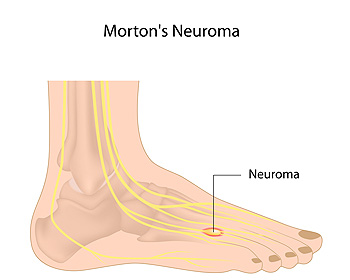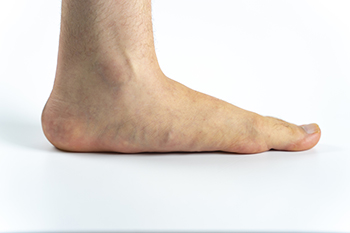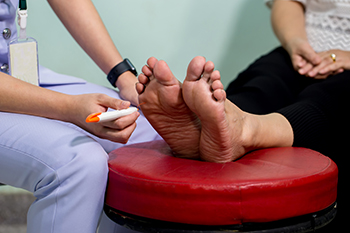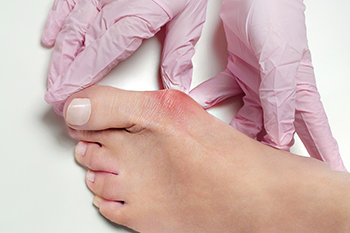Items filtered by date: June 2023
What Can Cause Morton's Neuroma?

A burning pain in the ball of the foot and the feeling of having a small pebble under your foot are signs that you may have Morton’s neuroma. This condition involves a thickening of the tissue across the metatarsal nerves, causing pressure and pain. It is generally felt in the space between the third and fourth toes, and may be connected to the type of shoes that are worn. High heels with pointed toes and shoes that are too tight can cause pressure on the metatarsal joints by pushing the weight onto the ball of the foot. Certain foot deformities, such as hammertoes or bunions, can cause the weight of the body to shift onto the ball of the foot. High impact sporting activities, such as tennis and running, can place increased stress in the area. Additionally, rock climbers and snow skiers may develop Morton’s neuroma, as a result of a combination of wearing tight shoes that can exert pressure on the toes. For a diagnosis and treatment options, it is suggested that you make an appointment with a podiatrist.
Morton’s neuroma is a very uncomfortable condition to live with. If you think you have Morton’s neuroma, contact Harvey Jacobs, DPM of Quality Foot Care Center. Our doctor will attend to all of your foot care needs and answer any of your related questions.
Morton’s Neuroma
Morton's neuroma is a painful foot condition that commonly affects the areas between the second and third or third and fourth toe, although other areas of the foot are also susceptible. Morton’s neuroma is caused by an inflamed nerve in the foot that is being squeezed and aggravated by surrounding bones.
What Increases the Chances of Having Morton’s Neuroma?
- Ill-fitting high heels or shoes that add pressure to the toe or foot
- Jogging, running or any sport that involves constant impact to the foot
- Flat feet, bunions, and any other foot deformities
Morton’s neuroma is a very treatable condition. Orthotics and shoe inserts can often be used to alleviate the pain on the forefront of the feet. In more severe cases, corticosteroids can also be prescribed. In order to figure out the best treatment for your neuroma, it’s recommended to seek the care of a podiatrist who can diagnose your condition and provide different treatment options.
If you have any questions, please feel free to contact our office located in Somerset, NJ . We offer the newest diagnostic and treatment technologies for all your foot care needs.
Two Categories of Flat Feet

Pain can sometimes occur in people who have flat feet. The majority of babies are born with flat feet, and this may extend into adulthood. Flat feet are defined as the foot having no arch or very low arches. This can cause an inability for the foot to lie flat on the ground and can affect posture. Some of the symptoms that patients may have with flat feet are swelling, pain, and stiffness, which may indicate an underlying disorder in adults. Flat feet can affect the alignment of the body and can compromise walking, standing, and running. The two categories of flat feet can include flexible and rigid. Children are more affected by flexible flat feet, and the arch cannot be seen while standing but will reappear while sitting down. The arch is non-existent in people who have rigid flat feet, regardless of any weight that is put on the foot. There are specific stretches that can be done to strengthen the foot. If you have flat feet, it is strongly suggested that you are under the care of a podiatrist who can help you with relief techniques.
Flatfoot is a condition many people suffer from. If you have flat feet, contact Harvey Jacobs, DPM from Quality Foot Care Center. Our doctor will treat your foot and ankle needs.
What Are Flat Feet?
Flatfoot is a condition in which the arch of the foot is depressed and the sole of the foot is almost completely in contact with the ground. About 20-30% of the population generally has flat feet because their arches never formed during growth.
Conditions & Problems:
Having flat feet makes it difficult to run or walk because of the stress placed on the ankles.
Alignment – The general alignment of your legs can be disrupted, because the ankles move inward which can cause major discomfort.
Knees – If you have complications with your knees, flat feet can be a contributor to arthritis in that area.
Symptoms
- Pain around the heel or arch area
- Trouble standing on the tip toe
- Swelling around the inside of the ankle
- Flat look to one or both feet
- Having your shoes feel uneven when worn
Treatment
If you are experiencing pain and stress on the foot you may weaken the posterior tibial tendon, which runs around the inside of the ankle.
If you have any questions please feel free to contact our office located in Somerset, NJ . We offer the newest diagnostic and treatment technologies for all your foot and ankle needs.
Why Live with Pain and Numbness in Your Feet?
Diabetic Patients and Neuropathy

Neuropathy affects the nerves throughout the body, including the feet, and it can cause the inability to feel pain in the soles of the feet. Many people who have this condition are unable to feel if their feet are hot or cold, and they may have a consistent tingling or numbing sensation. People who are diabetic can develop neuropathy which can lead to serious consequences as wounds can develop on the bottom of the feet that are not noticed. Untreated wounds in these patients may lead to getting foot ulcers, and it is imperative the bottom of the feet are checked daily. Patients who are afflicted with neuropathy may have difficulty walking, balance may be affected, and it may possibly lead to falling. If you have this condition, it is strongly suggested that you are under the care of a podiatrist who can guide you toward proper management techniques.
Neuropathy
Neuropathy can be a potentially serious condition, especially if it is left undiagnosed. If you have any concerns that you may be experiencing nerve loss in your feet, consult with Harvey Jacobs, DPM from Quality Foot Care Center. Our doctor will assess your condition and provide you with quality foot and ankle treatment for neuropathy.
What Is Neuropathy?
Neuropathy is a condition that leads to damage to the nerves in the body. Peripheral neuropathy, or neuropathy that affects your peripheral nervous system, usually occurs in the feet. Neuropathy can be triggered by a number of different causes. Such causes include diabetes, infections, cancers, disorders, and toxic substances.
Symptoms of Neuropathy Include:
- Numbness
- Sensation loss
- Prickling and tingling sensations
- Throbbing, freezing, burning pains
- Muscle weakness
Those with diabetes are at serious risk due to being unable to feel an ulcer on their feet. Diabetics usually also suffer from poor blood circulation. This can lead to the wound not healing, infections occurring, and the limb may have to be amputated.
Treatment
To treat neuropathy in the foot, podiatrists will first diagnose the cause of the neuropathy. Figuring out the underlying cause of the neuropathy will allow the podiatrist to prescribe the best treatment, whether it be caused by diabetes, toxic substance exposure, infection, etc. If the nerve has not died, then it’s possible that sensation may be able to return to the foot.
Pain medication may be issued for pain. Electrical nerve stimulation can be used to stimulate nerves. If the neuropathy is caused from pressure on the nerves, then surgery may be necessary.
If you have any questions, please feel free to contact our office located in Somerset, NJ . We offer the newest diagnostic and treatment technologies for all your foot care needs.
Genetics and Wearing High Heels May Cause Bunions

People who have bunions report it can be one of the most painful foot conditions to have. It is defined as a bony protrusion that forms on the side of the big toe, and will gradually become larger if treatment is not received. A bunion can be caused by genetic reasons, or from wearing shoes that have a tapered toe area. High heels can fit into this category, and it is beneficial to choose shoes that have a lower heel if these types of shoes need to be worn. Corns and calluses may form on top of the toes, as they touch the top of the shoe. This can be uncomfortable, and mild relief may be felt when the shoes that are worn can accommodate the bunion. If the bunion becomes severe and causes the inability to complete daily activities, surgery may be an option to consider for removal and permanent relief. If you see a bunion that is starting to form, it is suggested that you contact a podiatrist who offers you treatment options that are right for you.
If you are suffering from bunions, contact Harvey Jacobs, DPM of Quality Foot Care Center. Our doctor can provide the care you need to keep you pain-free and on your feet.
What Is a Bunion?
A bunion is formed of swollen tissue or an enlargement of boney growth, usually located at the base joint of the toe that connects to the foot. The swelling occurs due to the bones in the big toe shifting inward, which impacts the other toes of the foot. This causes the area around the base of the big toe to become inflamed and painful.
Why Do Bunions Form?
Genetics – Susceptibility to bunions are often hereditary
Stress on the feet – Poorly fitted and uncomfortable footwear that places stress on feet, such as heels, can worsen existing bunions
How Are Bunions Diagnosed?
Doctors often perform two tests – blood tests and x-rays – when trying to diagnose bunions, especially in the early stages of development. Blood tests help determine if the foot pain is being caused by something else, such as arthritis, while x-rays provide a clear picture of your bone structure to your doctor.
How Are Bunions Treated?
- Refrain from wearing heels or similar shoes that cause discomfort
- Select wider shoes that can provide more comfort and reduce pain
- Anti-inflammatory and pain management drugs
- Orthotics or foot inserts
- Surgery
If you have any questions, please feel free to contact our office located in Somerset, NJ . We offer the newest diagnostic and treatment technologies for all your foot care needs.

